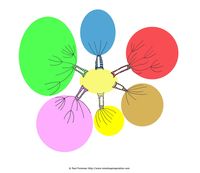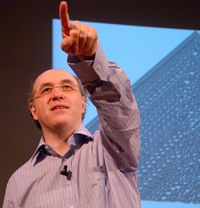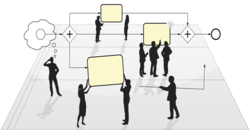Think of this as Volume 17, Number 49 of the newsletter I have written weekly since March, 1997. Enjoy.

This is a subject I'll be discussing both this week and next week. Come along for the ride.
It's an important subject because that is precisely the world we're living in. Yet hardly anyone has begun to get their arms around this, let along build a curiculum around it. Instead we're still teaching kids using factory methods from the 19th century, and a set of curricula from the 20th century that doesn't take the Internet into account at all.
And if today's kids are going to be contributors to society, the most important course isn't even being taught, not even in college.
No one is teaching the Internet.

The skills of journalism already lead to leadership in every field, from science to economics. You listen to the people who seem to know what they're talking about, those with wide-ranging knowledge, an easy way with words, those who give good interviews to both print and broadcast outlets, and who can conduct such interviews.
What that takes is an ability to read, to write, to ask questions, to get answers,to think on your feet, and to synthesize something new from a deep understanding of what's out there.
For the Internet Age, these skills are more important than ever.
Reading

Whatever your language is, you need to master that language. Services like Google Translate are great, but the dominance of English within the Internet is only going to increase with time, because it's the world's second language.
Speaking of second languages, the second language of the Internet isn't English, but math. Math is the only language that's common the world over. Someone in China can understand an equation as easily as the Arab who wrote it.
So the curriculum in early grades doesn't change. Kids need to learn to read, write, and do arithmetic. But the techniques we use should change radically, because of what the Internet does better than any human teacher.
The Internet makes presentation better. You can get the best teacher to present material to all the kids. The Internet makes test-taking uniform. The Internet makes it possible to share problems with other kids, and other teachers. The Internet can deliver problem sets without end.
But there is one thing the Internet can't do. It can't look into a child's eyes, and keep going after a problem from different angles until understanding flashes in those eyes. The Internet can't yet tutor, as only a good teacher can tutor. The Internet has infinite patience, but it has no way of drawing the full attention out of anyone using it. The Internet can't really tell if you're cheating, if you're dyslexic and just pretending to read.
In short, the Internet needs teachers. But it doesn't need sages on stages. It doesn't need presentation, and it doesn't need people to administer tests. The Internet needs teachers, real teachers, tutors who can go one-on-one and create understanding from whole cloth, people who can inspire and turn on the light of knowledge, one kid at a time.
Understanding
It's one thing to understand a word or a word problem. It's another thing to understand what you see online.
By understanding, I'm talking about the ability to make connections between different bits of information, to synthesize it into an understanding that may be proper or may just be unique. It's the ability to use the raw clay of what you get online and create something with it, the ability to create and defend a vision, to develop an idea.
Some of this skill is taught in high school. Whenever a kid does a theme, it's graded based on whether the student understood what they were reading and had something useful to say about it. There's no “right” answer, there's just a correct process used to get to whatever answer you wind up with.
But with a tool like the Internet, we need a broader definition of understanding. You don't just have the world's literature in front of you, but most of what has ever been written about it. You not only have scientific experiments here, but millions of scientific papers. You don't just have the law as written here, but every decision ever made with it.

What you need to teach, in the age of the Internet, and what you have to know to make the most out of the resource is imagination. Creativity matters here. Coming up with something new to say matters a lot. If your school isn't teaching creativity, what are they teaching that's useful?
Does this mean you need to learn programming? Not as such. The nature of programming is constantly changing, as computers get cheaper and we learn to abstract more-and-more complex concepts into a single command.
My wife, for instance, first learned Assembly language, and used it for years. Then she switched to Cobol. Now both seem obsolete, and she's learning Java. This process will continue. Object-oriented languages, command-line languages, languages that manipulate sets of commands, that let you build complex systems out of pieces rather than just out of bits, are the wave of the future. Each system will start simply, then grow in complexity.
One example of what's coming is Wolfram Language. Mathematician Stephen Wolfram (above, left) is building it off a program called Mathematica, and says it can manipulate ideas and computing tasks in fabulous new ways.
Should you teach a kid the Wolfram Language? Maybe a smart one will want to learn it. But you really need to understand how computer languages are built, how programs are built, and how programmers think in order to master the Internet of the future. Because the languages themselves will change, but the process language builders and users have to use those languages will not.
Next week, more thoughts on what tomorrow's Internet leaders will need to know.











Great analysis of an important topic. Can’t wait for SEVERAL further installments!
Great analysis of an important topic. Can’t wait for SEVERAL further installments!